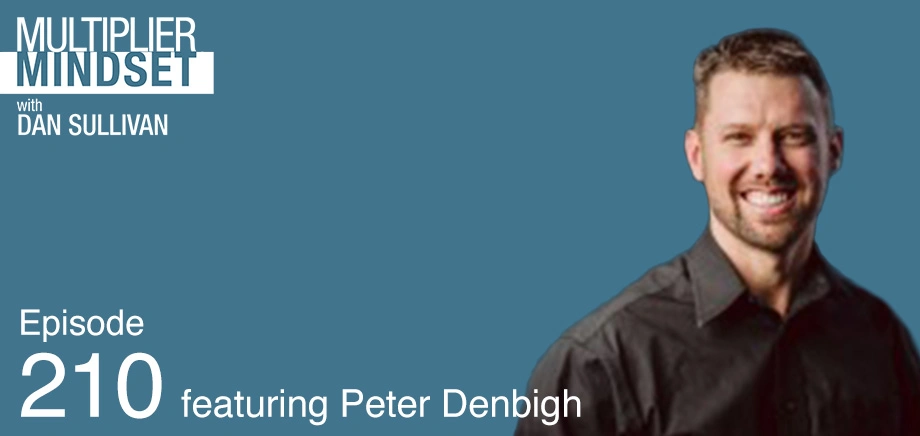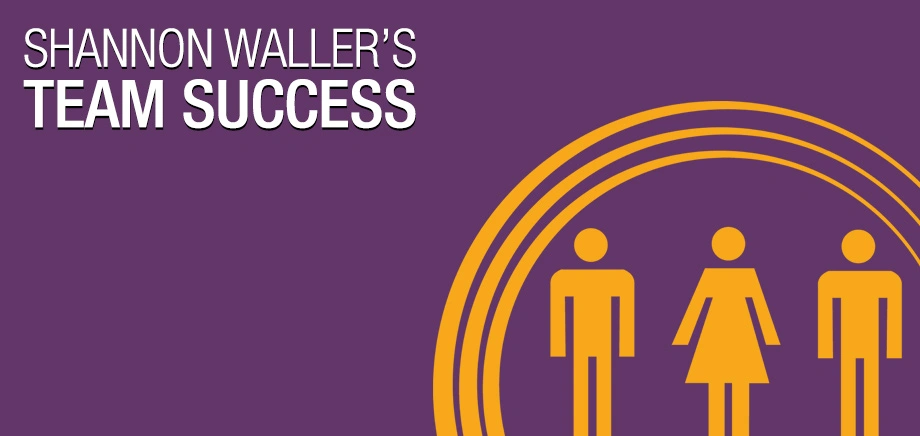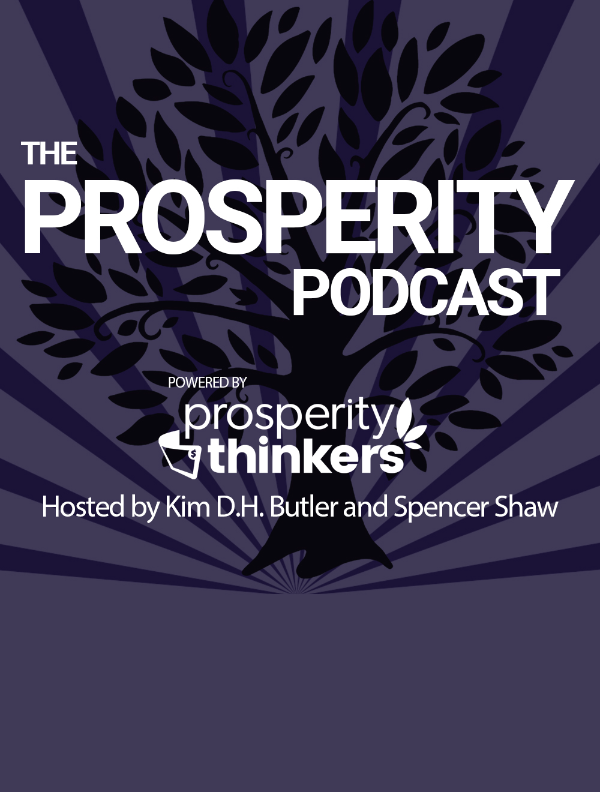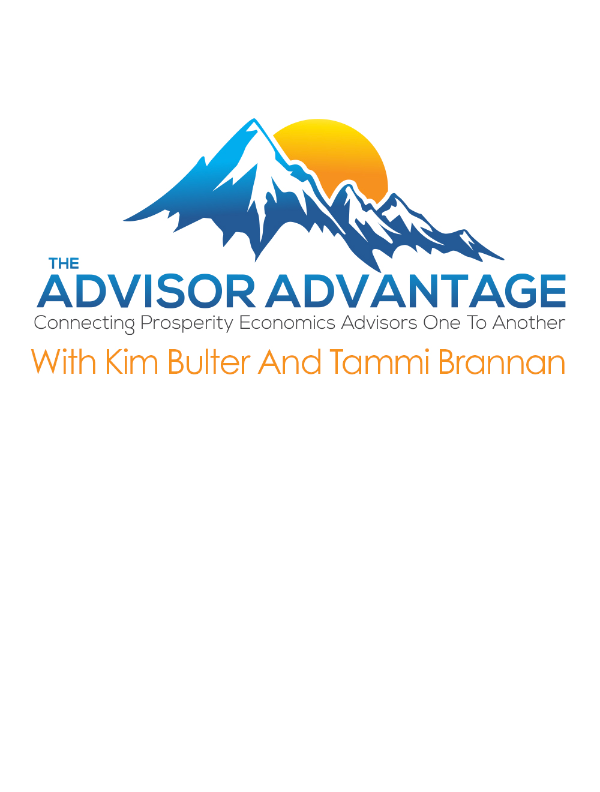You Don't Need Permission To Be An Entrepreneur, with Peter Denbigh
February 01, 2024
Hosted By
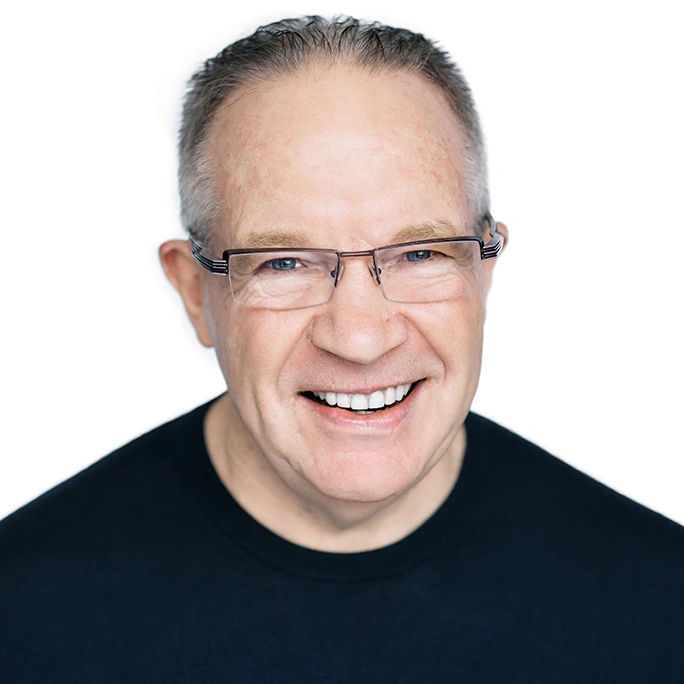 Dan Sullivan
Dan Sullivan
Peter Denbigh grew up in what he describes as “the middle of nowhere,” Virginia. He wanted more, and as soon as he was old enough, he used his entrepreneurial mindset to start earning money. In this episode, Peter shares the many business lessons he’s learned from growing his own companies.
Here's some of what you'll learn in this episode:
- How Peter learned to think long term.
- The tech company he founded while he was a university student.
- How Peter recovered from a dark time in his career.
- How he created one of the best-selling games of 2016.
- What The Strategic Coach® Program has given him.
Show Notes:
The Strategic Coach Program was designed for entrepreneurs who are active and “all over the place.”
It’s a tremendous strength to realize that being an entrepreneur is a life sentence.
Luck is involved in entrepreneurial success, but the entrepreneur needs the capability of taking advantage of luck.
The more value they provide, and the faster they can provide it, the more an entrepreneur gets paid for their time.
When you’re a little bored and you have your eyes open, interesting opportunities come your way.
Kickstarter lets you test a product and validate it, and if it works, you get money.
An idea is worthless without persistent and productive execution.
You don’t need permission to say, “This is how I’m going to be in the world.”
The ride is what teaches you to hang on.
Some people are born with the permission to be themselves, but a lot of people aren’t.
If it doesn’t excite you, it isn’t worth doing.
Resources:
The Gap And The Gain by Dan Sullivan and Dr. Benjamin Hardy
Who Not How by Dan Sullivan and Dr. Benjamin Hardy
10x Is Easier Than 2x by Dan Sullivan and Dr. Benjamin Hardy
How to Expand Your Team's Unique Ability®
Episode Transcript
Dan Sullivan: Hi, this is Dan Sullivan, and I'd like to welcome you to the Multiplier Mindset Podcast.
I'm introducing Peter Denbigh, who lives in, as he describes it, nowhere, West Virginia. I was thinking as I was watching him describe his experience, I said, government organization, do not hire this man. Corporate organization, do not hire this man. You know, it was interesting, somebody in one of the workshops the other day, and it reminded me of this, they asked me, "In all your coaching experience"—next year I'll be 50 years that I've been coaching entrepreneurs, and our workshop program company, we started in 1989, so we'll be 35 years—they said, "You've had all this coaching experience, are there any kind of Coach clients that kind of get to you, that kind of bother you?" I said, you know, "The ones who are most active and the ones who are all over the place, that's what our program was designed for." And I said, "So if they can run up the walls and run across the ceiling and come back down, this is my kind of person."
And Peter checks all the boxes for this. But a couple of things, you can really, really see there was no other way for him. That is a great strength among entrepreneurs. That's a tremendous strength that you realize that being an entrepreneur is a life sentence. It's a life sentence that there is no alternative to being an entrepreneur. And I could see Peter kind of growing up really young, very rambunctious. But when he got to the end, you could see just the sum total of everything he's learned. And he's now taking a longer perspective, understanding that it's all teamwork, it's all partnership. And the other thing is that luck is certainly involved in entrepreneurial success. But what I see in Peter is he also has the capability of taking advantage of luck when he comes across it.
Peter Denbigh: My name is Peter Denbigh. I currently have two projects. One is a large co-working spaces in cool rural settings, and the other is a consumer product goods company that produces ridiculous party games and board games—physical games, not video games— that are distributed worldwide. I grew up in a small town in West Virginia. If you draw a big circle and call it nowhere, I live right in the middle. I lived right in the middle. And when you're in an environment like that, you have to do things yourself. You have to figure things out. You become really good at problem solving. And my family was in kind of the small business world as well. So that's kind of the world I knew. And so from the age that I could push a lawnmower, I was mowing lawns and doing things to earn money and discovered that that was really fun to be able to do something, provide value for someone and get paid for it. And the more value you provided and the faster you could provide it, the more you got paid for that amount of time. And so I kind of latched onto that idea and didn't really enjoy the idea of working for someone else.
So I went to college at James Madison University in Harrisonburg, Virginia. Had a couple little side hustles while I was a student there as well. During my senior year at JMU, I started a tech company that did outsourced help desk work, like fixing computers, because back at that time, computers broke even more than now. We struck up a relationship with the help desk of the school and grew that. And grew it. And I was really good at growing a company, but not so great at managing the money side of it. So at our peak, we had, I think, 26 employees and about $50,000 tax lien for payroll taxes that I forgot to pay. And one thing led to another, exited that, went back to school, and started these other ventures. So when the tax liens happened and when, by the time the electricity had been cut off in my apartment the second time, I was like, all right, this is kind of a dark time, figuratively and literally, and I need to reboot.
So I was able to exit the companies, relieve some of the debt. I got to keep the tax lien because the IRS is giving like that. And went back to school. So I went back to JMU for my MBA and while working at the school a little bit, so that's how I paid for it because I was flat broke, got my MBA and set out on a track of what I called Life 2.0. All right, I had Life 1.0. It got me to this point. I learned a lot. Obviously, some things didn't work the way I wanted them to work. I certainly wasn't where I wanted to be. And now that I understand "The Gap And The Gain," I understand the danger and the opportunity there. But Life 2.0 is going to be different. Instead of commoditizing things, instead of being paid on a per hourly basis, how do I scale this? How do I transform energy into efficiency and turn it into something fun?
And so I just had the opportunity to just observe for a little bit. I had the opportunity to be a little bit bored. And when you're a little bit bored and you have your eyes open, interesting opportunities come your way. The first opportunity that came my way was built on my love of the outdoors. I love rock climbing, I love mountain biking, and I love the outdoor industry. I started a business producing really funny stickers for the outdoor industry that initially poked fun at those stick figure families you see on the back of minivans, except there's a stick figure family with, like, they're climbing up the side of the van and there's a rope hanging down with their cat and their dog and their kid and all that. Inserted myself into the outdoor industry, not knowing anything about the outdoor industry. And with the help of a very talented partner in the company, Scott, and his art and then my gumption, I guess, we ended up getting in, I think, 300 stores across the country selling these ridiculous stickers.
And they started out as ridiculous stick figures, and then they got kind of cool. And then we started doing stickers for resorts and shops and that sort of thing. But through that, I learned a lot. I learned, like, how retail works, and I learned how supply chain works a little bit, and we could get these things manufactured over here and get them over here, and I had to manage inventory and kind of level up a little bit. So that was a good knowledge set. In the meantime, I wanted to have other products, so I was fascinated with Kickstarter. And Kickstarter, oh wow, you can like test a product, validate it, and if it works, you get money, so you don't have to, you know, give your right arm for a loan and for your first inventory batch. So I think I had at least two Kickstarter campaigns that just bombed. They were so bad. And looking back, I understand why they were bad, but I learned a lot through that too.
So I had all these little lessons, and I'm still thinking in Life 2.0 mode. And at the time, I was studying this concept that I put together of the speed of execution. An idea is worthless, in my opinion, without persistent and productive execution. So, there are a lot of ideas everywhere, but what do you do with them? And I think, as an entrepreneur, we have a little bit of a gift of being able to take an idea from this concept to, what does a reality look like for this idea? And I was watching a movie called The Boss with Melissa McCarthy in it. And early in that movie, there's a scene where she's laying back, her cheeks are all stretched out, and she's talking and getting her teeth whitened. And I just thought that was really funny. I may have a broken sense of humor, but I really liked it. And I was thinking, you know, it'd be really funny if you could take that, have a phrase, and put in one of those mouthpieces, and someone has to figure out what you're saying. It's like, oh, that could be a game. That could be a Kickstarter campaign. Hmm.
And so here I'm studying this idea of speed of execution. And I was like, all right, Peter, I'm going to challenge you to get this idea from this moment to live on Kickstarter in as short a time as possible. Can you do it in three weeks? And I was like, OK, I think I can do that. Yeah, I'm talking to myself through all this, but sometimes you have to do that. You have to pump yourself up. So I went on eBay at the time and found mouthpieces that folks were selling. I hope dentists never actually buy their mouthpieces off of eBay. But in my case, it worked out okay. And then I took a USPS flat rate shipping box. Don't tell them because they'll probably charge me for it. And I covered it in red vinyl because I had the sticker company. I was like, oh, here's some vinyl. Let me make it look all pretty. Then I went on 99designs and said, I want to do this game. Can you make up a logo? And I picked the winner. And it still very closely resembles the logo that's on the box today. And I slapped it all together. And this, so we're about two weeks in now at this point that I found a couple of mouthpieces. I got cards printed from, I think it was Moo was an old business card. I don't know if they're still around or not, but they produced high quality business cards to make it look like game cards.
And it was enough to take some good pictures. And then I sat down in my little office in front of a camera and just made a total fool of myself with the Kickstarter video. Put in a mouthpiece, talked about the game. You couldn't understand a word I was saying. So I had captions underneath and put this thing up on Kickstarter. And that, plus some really good luck. And I'm not going to understate the amount of luck that was involved in this. Some videos went viral. My video went viral. These videos went viral that were just associated loosely. And the thing took off. And then we were kind of off to the races. That's the origin story for the Watch Ya' Mouth game, which was our most popular game. We started shipping it late 2016, and by the end of 2016, it was the fourth or fifth best-selling game of the whole year of all games.
So we got really lucky. There were some strong partnerships involved, some amazing team members involved. It certainly wasn't just me. But a lot of late nights and a lot of just, okay, here's the next thing. Here's a problem, let's solve that. Here's 10 problems, okay, let's solve one at a time very rapidly and drink a lot of coffee. So we really pushed forward, and it was a pretty cool journey. So to date, I think we've sold over three and a half million copies worldwide, something like that.
It still sometimes takes me a minute to just be present and be like, hey, this worked. Okay, what can I learn from that? How do we turn this into the next thing and roll with it a little bit? That experience from moving from those challenging times into equally challenging, but perhaps brighter times, it taught me to think long term. It taught me to think, to not be afraid of pivoting. It taught me that I can pivot, that pivoting is possible, not just me, but building teams around you. And when things get challenging, we can all move in a different direction if we need to. It taught me that success is kind of up to me. Like, I am the limit on my success and still am painfully today. And it taught me that you can work your way out of stuff. I'm sure Strategic Coach would not have agreed with the amount of grind and hours that I put in early in this, and I didn't surround myself with nearly enough "Whos" and zero Free Days.
So I can't promote that lesson here, but I did absolutely just work really hard and listen to my audience and think in terms of partnerships, think in terms of this greater whole that can happen. Part of the reason that our game was successful is because we did link up with another company that helped us get in Target. We handled the Amazon side, they handled the Target side, but we lifted each other up. It wasn't a zero-sum game. The rising tide lifted all ships. The first hire we ever made, her name is Caitlin, and we brought her in to help with customer service because we were getting all sorts of tickets, and hired her within 20 minutes of the interview and asked her to start that afternoon, bless her heart. And she did start working out of our living room, not even realizing the fact that she had a ton of Amazon experience. She's a Southern belle with a wonderful heart that can sweet talk her way into any customer service thing. And just leaning into, what do you know? What does this teammate know? Like, just because you were hired here, you're not gonna just be in these guardrails the whole time. How do we, as a team, move?
And the Unique Ability Teamwork is now the term I know applies to that. I hadn't a clue back then. I've learned that just because you do this thing in this industry does not at all require you to not also do this thing in this other industry. I think a lot of people question when entrepreneurs jump around from industry and industry. And I think there's an undertone or there's a common denominator there of the things that interest us, and we're just pursuing what interests us, and that's really fun, and that's what lights us up, and that's where we can bring value. Also, some of us are ADHD. We get a little bored with this thing over here. We have to move on. My story's not that unique or special or great, but I've gone from the IT industry to the outdoor industry to toys and games. Now, I'm in somewhere between commercial real estate and service industry, and who knows what's next?
But there's been a lot of common threads throughout that that have helped our teams, when we jump from one industry to the next, kind of come in with this fresh perspective. We're not jaded. We aren't afraid to challenge the status quo. Well, let's do it this way and shake people up and ruffle a little feathers and kind of giggle about it at the same time.
You know, I'm really excited about a couple things. The first is, we have this co-working space in Stanton, Virginia, and it's a 30,000-square-foot facility in a town of 25,000 people in the beautiful Shenandoah Valley. We're nestled between the Blue Ridge Parkway and George Washington National Forest, connected by two great interstates, eight colleges and universities, and blah, blah, blah. So it's this unique situation where a co-working space isn't supposed to exist because there's not enough market for it. Well, out of this facility are 128 companies that call it home. And our mission with that project is to reduce barriers to innovation. And it is inspired by this entrepreneurial roller coaster I've ridden since I was probably 14. And if we can lessen the lows and accelerate the highs for our members, some of whom are startups, some of whom have been in business for years, then we're doing our job.
And now over 30% of the companies in downtown Stanton actually operate out of our facility. And I'm looking at that, and I'm like, wow, this has had a tremendous impact on a lot of people. Why can't we do more of this? So we are currently in the process of expanding rapidly. So we have two other locations under way, several others identified, and hoping to 10x that as rapidly as we can, find the right partnerships out there. We've cracked the code on the culture that's within those walls, and that really has me excited.
I also have an interest in helping other people more directly and taking some of the pains of my past and the lessons I've learned and the transformations I've had in this Life 2.0 concept. And you don't need anyone's permission to just say, from this point forward, starting today, when I wake up tomorrow morning, when I wake up right now, this is how I'm going to be in the world. I really want to coach some people, and I really want to help those that have been in moments in their life where they have pictured this future, but then they're looking back, they're like, that's not even close to where I am, but I still feel it and it's still pulling me. And that bigger future is pulling them. If they have that inner drive, then I'm really interested in helping them get there and achieve that and, I don't know, learn from the bumps and bruises and the school of hard knocks that I've been through.
You know, I don't want to make the ride completely smooth because the ride is what teaches you to hang on. But I think that there's a lot of opportunity out there to help a lot of folks, and yeah, kind of just magnify some of my lessons and turn my challenges into something that benefits lots and lots of other people. I think that'd be pretty powerful.
I have one son, a 13-year-old son, that's just an incredible young man. He's smart and athletic and all those things that dads are proud of. And he's my snow buddy that I can no longer keep up with in the woods, but he revels in that. And he's my mountain bike buddy. And we've recently gotten into airsoft, and that really hurts when you get shot. But for some reason, he loves it. So I'm leaning in, and that's a lot of fun. And I have an amazing partner in my life, and she's the light of my life and my rock climbing buddy, my mountain bike buddy, and the two of us and our Australian Shepherd dog are regularly outside in the woods having a really good time.
Strategic Coach has been an instrumental part of my journey and transformation. It's given me, I would say, three things. It's given me the tools, the language, and the permission to transform. Tools such as "always measure backwards," "Who Not How," "10x Is Easier Than 2x." Those fundamental concepts that Coach has taken and boiled down to beautiful simplicity has been very, very important to give me guideposts and targets of kind of the hows of how to get there. The Who Not How, I couldn't have the projects we have right now without the incredible team we have. I am thankful every day I walk into the doors or hop on a call with my team. I'm like, God, I'm so glad you're here. How did you find me? Why are you here? I don't know, but thank you. And like, it's amazing.
The language on transformation has been really important. So that gets into the, it's kind of a tangent to the tools, but it's being able to talk about transformation in a way that is palatable and can inspire my team and doesn't overwhelm my team. I very easily overwhelm my team when I walk in, I'm like, hey, why don't we do this and this and this? And they're like, whoa, buddy. But tools like The Impact Filter have helped me refine the language: "OK, here's what I'm thinking, and this is what can it enable. And then I understand that you really think in terms of details. So help me see around the corner. What are the blind spots that I'm missing?"
But the thing that it gave me that was most profound early on was the permission to transform. Sitting down and getting to know yourself, getting to know who I am, when I took the Kolbe, when I took the StrengthsFinder, Kayanne is my advisor and puts up beautifully with me and pumps me up and helped me dissect all of this. And then we really got into understanding that I'm different from you. And that's a really good thing. And we're different, and this team's different. But it helped me not feel quite so weird. And I'm not afraid to be weird, but I don't want to be an outcast, you know? And I think the entrepreneurial journey can be a little lonely. And it's not even that it's lonely at the top, because quite often we're in the horse stall shoveling the stuff. But it's a scary, unorthodox journey, particularly even more so pre-pandemic. I always question myself, am I really cut out for this? Should I really be doing this? Who am I to invent a game? Who am I to buy a building? Who am I to think that I can build this company versus, gosh, it'd be nice just to go sit in a cushy job for six figures and not worry about it.
And so I had this internal conflict. Logic was telling me, you have tax liens. You made some mistakes in this business. You shouldn't be doing this. You aren't worthy. And then I had this other side of me that's like, you know what? You broke into industries that you had nothing to do with, you knew nothing about. And you did things differently. And you found success. And you grew a team and, you know, The Gap And The Gain-type stuff before it was defined for me. But having tools like Kolbe and StrengthsFinder and PRINT and all this stuff, it helped me define who I am. It helped me put language behind who I was. I'm a Quick Start. And I can turn that into a really positive thing. I can drive my team crazy with it, but if, you know, done properly, it's okay.
StrengthsFinder, I'm Futuristic Achiever and a few other things. Well, yeah, that feels good and okay. It's okay to be me. Strategic Coach has really helped me be okay being me, being an entrepreneur, driving hard, breaking things along the way and, you know, kind of enjoying the journey, enjoying the ride.
Some people are born with the permission to be themselves, and a lot of us aren't. A lot of us are ourselves. What's the quote? "Be yourself because everyone else is taken." But we're too scared to be. Like, I don't know, this feels weird, and what are people going to think? And when you come in here, and you're with folks like Chad, who's just a bundle of energy and has done this thing and this thing and this thing. And he's not afraid to admit when he screws something up or that he's human. It's like, oh, you're one of me. That's really cool. Thanks. Thanks for sharing that. It's nice to know another one. And then you start looking around. And the longer you're in the Program, I think the more walls kind of start coming down, you get to gel with folks a little bit better and that's been a lot of fun. You just realize that everybody's on their own little journey.
If it doesn't excite you, it's not worth doing. It doesn't matter what other people tell you should excite you. It doesn't matter what has been tried and been unsuccessful in the past. What really matters to me when I'm talking to folks is, does it light you up? And if it lights you up, then you're generating energy intrinsically. And when you're generating energy intrinsically, you can push through so much. Get to know yourself and lean into who you are. Use these tools. And don't be someone that you're not. Don't do it for someone else. Don't do it for yourself. Don't do it for the reflection in the mirror. Just lean in. I mean, I grew up in the middle of nowhere in West Virginia. When I was 18, I decided I wanted to be someone else. So I went to a great school in Virginia. When some of those things didn't work the way I wanted to, I was like, all right, it's time for Life 2.0. Let's reboot. I didn't need a permission letter from anyone to do that. I wanted a permission letter. I really, really did. I wanted someone to just say, Peter, it's OK to start over. But no one would tell me that. And so finally, I just had to do it. Boy, I'm glad I did.
And so just listen to your heart. Manage your energy well. Surround yourself with good people. Never stop learning. Picture that bigger future. Don't be upset when you don't get to that bigger future. But just relish in the journey that's gotten you there. Don't compare yourself to others. I could go on and on and on with all the things that I tell myself. But really, entrepreneurship is nothing without, I think, the excitement that goes behind it. You don't have to justify the excitement. If it excites you, that's enough. You want what you want, I think is what Dan says. Just go get it.
Related Content
The Impact Filter
Dan Sullivan’s #1 Thinking Tool
Are you tired of feeling overwhelmed by your goals? The Impact Filter™ is a powerful planning tool that can help you find clarity and focus. It’s a thinking process that filters out everything except the impact you want to have, and it’s the same tool that Dan Sullivan uses in every meeting.

